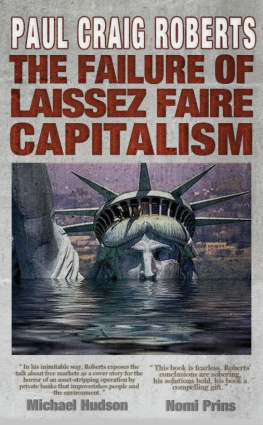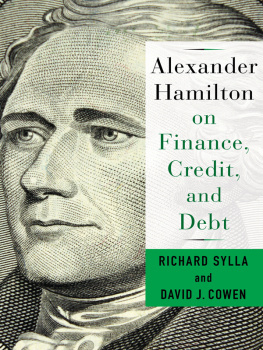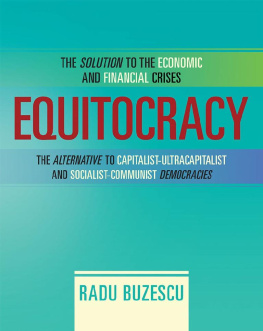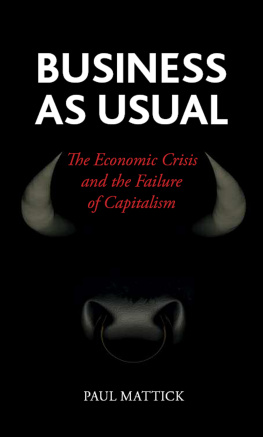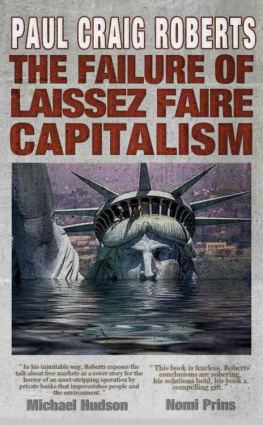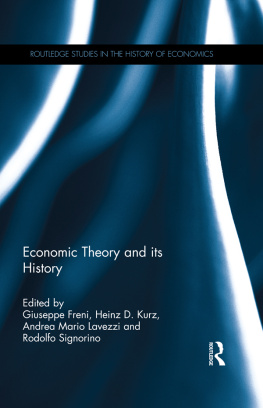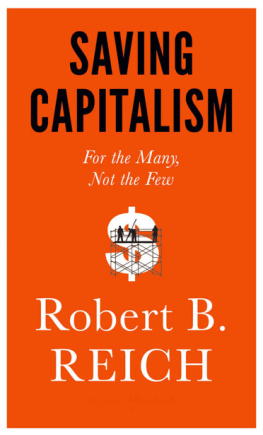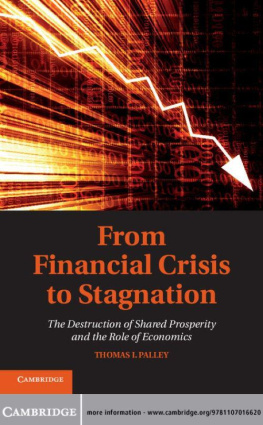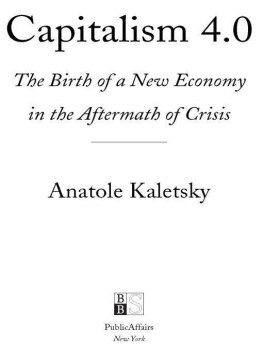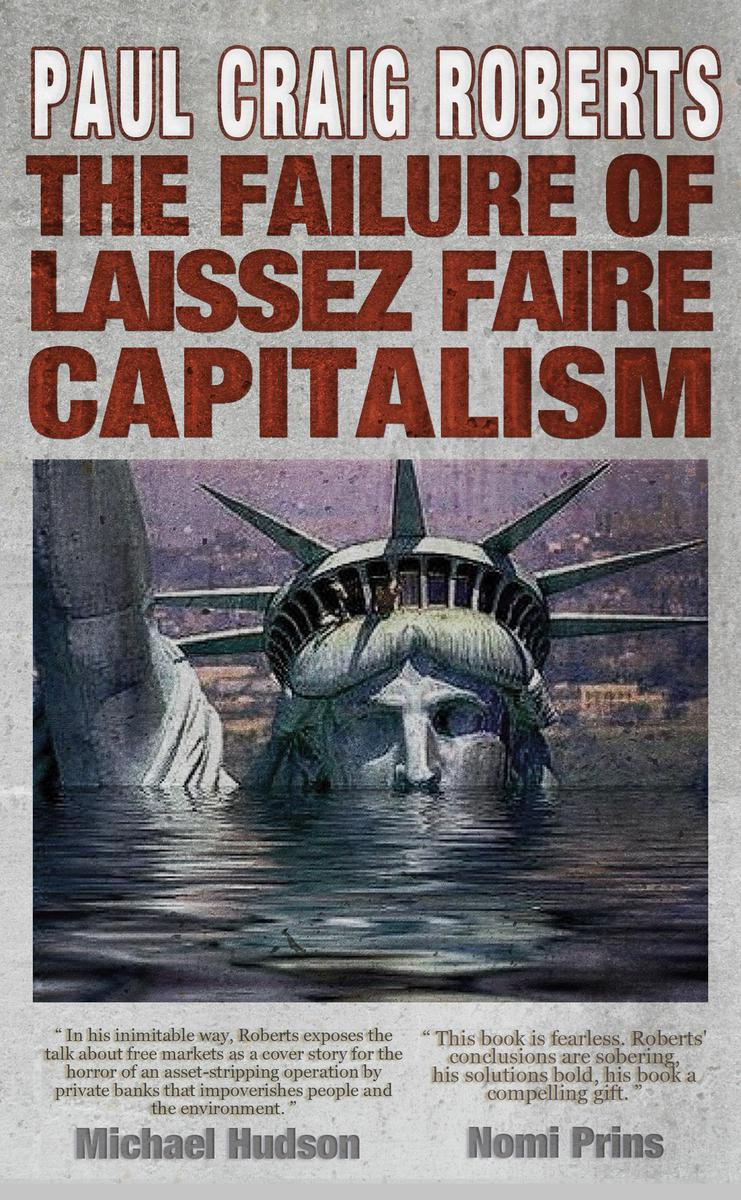
The Failure of Laissez Faire Capitalism andEconomic Dissolution of the West
Towards a New Economics for a FullWorld
By Paul Craig Roberts
Copyright Paul CraigRoberts 2013
All RightsPreserved
ISBN:978-0-9884065-1-3
SmashwordsEdition
Praise for this book from Michael Hudson and NomiPrins
In his inimitable way, Roberts describes how therhetorical patter talk about free-markets is a cover story for thehorror of an extractive asset-stripping operation bypublicly-supported private banks and the governments that theycontrol that impoverishes people and the environment. He shows thatunrealistic assumptions made by free-trade ideologues have led tothe New Dispossession and a political and economic race to thebottom, applauded as a success story by junk economists, who ignorethe reductions in living standards and rise in environmentalinstability.
Roberts describes how Germanys economic surplus isbeing used to serve private European financial predators, and howthe highly touted foreign investment in America consists of theuse of credit and trade surpluses that foreign countries have withthe import-dependent US to finance the foreign purchase of the USeconomy, rather than to provide new capital formation that wouldre-employ Americans dispossessed by jobs offshoring. - Michael Hudson
The Failure of Laissez Faire Capitalism, isfearless. It transcends Roberts illustrious career and prior worksof intellectual and practical analysis. We are at the crossroads ofa crumbling world where both policies and ideologies have failed.Roberts shows the dangers of clinging to the idea that markets arefree and to the belief that unrestrained and unregulated capitalismis positive. Jobs offshoring destroyed middle class prospects, andfinancial deregulation fostered a rapacious banking industry thathas removed itself from market discipline and threatens Westerneconomies with collapse. Roberts conclusions are sobering, hissolutions bold, his book a compelling gift. - Nomi Prins
Table of Contents
About Dr. PaulCraig Roberts
The Honorable Dr. Roberts was educated at GeorgiaTech, the University of Virginia, the University of California,Berkeley, and Oxford University where he was a member of MertonCollege.
He was Assistant Secretary of the US Treasury in theReagan administration, a member of the US Congressional staff,associate editor and columnist for the Wall Street Journal,columnist for Business Week, the Scripps Howard News Service, andCreators Syndicate, Senior Research Fellow, Hoover Institution,Stanford University, and was appointed to the William E. SimonChair in Political Economy, Center for Strategic and InternationalStudies, Georgetown University.
He is chairman of the Institute for PoliticalEconomy and author or coauthor of ten books and numerous articlesin scholarly journals. He has testified before committees ofCongress on 30 occasions.
Dr. Roberts was awarded the US TreasurysMeritorious Service Award for outstanding contributions to theformulation of US economic policy, and Frances Legion of Honor asthe artisan of a renewal in economic science and policy after halfa century of state interventionism.
To learn more about Dr. Paul Craig Roberts visit hiswebsite at: http://www.paulcraigroberts.com
Preface for theGerman edition
by Johannes Maruschzik
We are witnesses of a historical turning point. Anew world order is emerging. Economic power is shifting to the BRICstates and to other emergingcountries at an enormous pace. New alliances such as the ShanghaiCooperation Organisation (SCO) with China and Russia as drivingforces have been preparing the new economic world order well inadvance. It is very likely that they will dominate it.
However, the forces that have been leading theglobal economy throughout the past decades the U.S., UK,Euroland, and Japan are struggling to survive. Their economiesare in a process of disintegration. Especially in the U.S. and inEU countries more and more people are living in poverty. Furthersignificant losses in welfare are looming ahead. Major parts ofthese populations do not see any future for themselves in theglobal economy. Because of debt and unemployment, many states facepolitical chaos. There is risk that radical political forces willarise from the weakness of the political and economic system andcreate a new form of tyranny.
Economists share the responsibility for the declineof the economies of the Western World. Rather than impartiallyanalysing the changes in the global world economy in order todevelop responses, the different economic schools are slaves totheir ideologies. Frequently, what does not fit into the theory isneglected. Furthermore, many economists are corrupted by service tointerest groups and politicians who misuse the democratic systemfor their own purposes. By contrast, economists carrying out realscientific work are rare. They are hardly heard bypolicymakers.
These are key issues raised in this book by Dr. PaulCraig Roberts, who in the early stages of the government of U.S.president Ronald Reagan as Assistant Secretary of the Treasury wasresponsible for the economic policy of the UnitedStates. This book is a fundamentalchallenge both analytically and empirically to economic theory andpolicy as presently understood and practiced.
Part 1 reviews the successes and failures ofeconomics to the present time. It spares neither Keynesianeconomists, who are convinced that governments must have a big say,nor neoliberal and libertarian economists, who refuse anyregulation of markets by governments. After reading the firstsentences it becomes clear that the book is written by anindependent, thinker who is not afraid to question conventionalwisdom.
Paul Craig Roberts is closer to the libertariansthan to those who think governments must run the economy. As Fatherof Reaganomics he brought intoeconomic policy the insight that fiscal policy shifts the aggregatesupply curve, not merely the aggregate demand curve as Keynesianmacroeconomics taught. High tax rates discourage work and savingand thus reduce the response of supply to policies that stimulatedemand. The Agenda 2010 of the red-green German governmentincluding cuts of the marginal tax rates would have beenunthinkable without the changes that took place in the U.S. taxpolicy in the early 1980s and which were promoted by Paul CraigRoberts.
Libertarians think that human nature changesaccording to whether it is employed privately or publicly. Theydont accept that private power can be just as abusive as publicpower. I appreciate libertarians defence of liberty, but I haveotherwise lost patience with them. Paul Craig Roberts wrote to methese sentences at the time we were discussing the translation ofthis book. They link seamlessly to the warning Nobel laureateFriedrich August von Hayek expressed in his classic The Road toSerfdom in 1944: Probably nothing has done so much harm to theliberal cause as the wooden insistence of some liberals on certainrules of thumb, above all the principle of laissez-faire. [Byliberal, Hayek and Maruschzik mean classical liberal, akin totodays libertarian, not to postwar American liberals.]
In Paul Craig Roberts eyes Laissez-faire capitalismis problematic in three areas: Firstly, the author criticises asnaive the belief that markets are self-regulating. Markets aresocial institutions. It is the human actors in markets that requireregulating. Secondly, he brings home to us that the unconditionalbelief in the benefits of free trade in the age of globalism mustcause significant welfare losses and spread pauperism among thepopulation not only in some developing countries but also in theWestern World. Thirdly, he bemoans the ignorance of many economiststhat man-made capital is not a substitute for natures capital andthat the exhaustion of natures capital in behalf of short-termprofit is at the expense of future generations.
Next page
